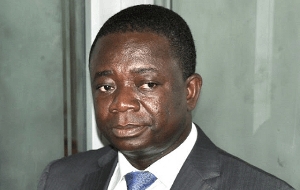- Home - Sports
- Soccer Portal
- Archived Sports News
- Sports Videos | TV
- Year In Review
- Sports Photos
- Sports Headlines
- Boxing
- Athletics
- Basketball
- Bodybuilding
- Cricket
- Golf
- Handball
- Hockey
- Martial Arts
- Tennis
- Volleyball
- Other Sports

General News of Tuesday, 18 April 2006
Source: --
BNI & CID Probe GIA
The Bureau of National Investigations (BNI) and the Criminal Investigations Department (CID) of the Police Service have commenced serious investigations into the operations of the Ghana International Airlines (GIA).
A source close to the two investigative bodies says their preliminary investigations had uncovered substantial issues of maladministration at the fledgling airline which needs probing into.
The case may even land in court this week the source revealed confidently. Furthermore, it has now come to light that the problems of the 17-month old airline which recently boiled over into the public domain had been simmering for some time.
This is evident from a document written and signed by Chairman of the Board of Directors Mr. G.A.M Azu, and dated February 21, 2006 a copy of which is available to Daily Guide.
The document was addressed to the Chief of Staff and Minister for Presidential Affairs, Kwadwo Mpiani, who has responsibility over the Aviation Sector.
It stated: ?Due to the perilous state of the company and the gross incompetence exhibited by Mr. Presbury it is recommended that action be taken immediately to discharge Presbury from the acting chief executive role and that an appropriate Chief Executive Officer be appointed?.
The 63-point letter pointed the problem areas of airline which the three new interim board members will be grappling with.
Mr. Azu, who is currently acting as Executive Officer for the airline, was emphatic that the Board no longer has confidence in the management team of GIA and urgently requested the assistance of the Minister in resolving outstanding issues.
It noted that Mr. Brian Presbury as the senior GIA management executive ?has shown poor management, poor interpersonal skills, and fiscal irresponsibility in certain particular areas?.
The BOD further disclosed that Presbury was actually acting as CEO but had re-assigned his officially-designated position of Chief Financial Officer and Chief Operations Officer to another individual, John Nagle whose appointment was not presented or approved by the BOD, thereby resigning his acting role as Chief Financial Officer by default.
The BOD therefore recommended that a substantive Chief Executive Officer be appointed to assume control of the company.
?The CEO should be able to hire and fire the management team as required and will be responsible to the BOD as outlined in the Ghana Companies Code of 1963?, the letter to the Minister stated and chronicled 63 reasons why the acting chief executive had to be relieved of his position.
These are the outlines of issues the Board had against the acting Chief Executive Officer of Ghana International Airlines who was subsequently and dramatically fired after a meeting at the Castle.
1. Failure to submit a budget to the Board on all spending, from November 2005 to date.
2. Failure to seek approval on all expenditures from November 2005 to date.
3. Hiring of consultants with no airline experience or knowledge without Board approval.
4. Hiring of consultants with no airline experience or knowledge that are not part of the business plan.
5. Assignment of corporate executives and management without Board notification and approval.
6. Hiring of management and staff that are not part of the business plan.
7. Retention of companies for services that are not part of the business plan at excessive costs and expense to the company.
8. Assignment of bank account signatories without Board notification and approval.
9. Opening of bank accounts without Board notification and approval.
10. Violation of Board directives to immediately cease hiring and recruitment.
11. Violation of Board directives to immediately cease out-sourcing of core business activities to other companies.
12. Violation of Board directives to immediately cease committing company to significant expenditures without Board approval.
13. Violation of Board directives to immediately cease contracting for significant purchases without Board approval.
14. Ignoring the Board request for copies of all employment agreements.
15. Ignoring the Board request for copies of all contracts.
16. Ignoring the Board request to terminate unprofitable below market fares (i.e. 100 GBP/USD fares which will result in nearly $1,800,000.00 a month in losses).
17. Ignoring the Board suggestions to investigate alternative narrow bodied aircraft that would be less expensive operationally then the proposed MD82, after being provided with details of other types, sources, prices, and availability data provided by the Board to management.
18. Ignoring the Board request to provide accurate information on all staffing and out-sourced employees and their roles.
19. Ignoring the Board request to provide account balances on all bank accounts.
20. Failure to have basic essential accurate information.
21. Failure to correct sales and marketing campaign.
22. Failure to obtain certification in a timely manner with the latest proposal submitted to the board showing 02 August 2006 as certification completion date.
23. Release of most key personnel with technical aviation knowledge.
24. Failure to employ any Ghanaian pilots nor make any attempt at communications with existing Ghanaian pilot candidates.
25. Failure to inform the GCAA of the use of alternative aircraft and to obtain an operating permit for it prior to use. (Use of N526RA in lieu of N930RD without prior GCAA approvals).
26. Failure to inform the GCAA of the changes in management and appropriate management.
27. Violation of GCAA regulations (management, aircraft, certification team, operating permit).
28. Frequent absence from the company (Only present for 2 months out of 5 months from September to January) (Absent during critical periods and holiday peak season during critical start up phases).
29. Failure to inform the Board of leave or time off in advance.
30. Violation of the prior disclosure agreement and failure to inform and seek approval on the use of a corporation/company owned by an officer/director prior to contracting for services (e.g. Mary Greenslade Information Services? owned by Sammy Crabbe).
31. Changing the business plan without Board approval.
32. Failure to manage company and government monies effectively. Spending and committing to more expenses than currently available funding.
33. Failure to control expenses so that any future cash inflows are properly managed. 34. No initiative in any costs controls.
35. Failure to respond to Board requests for proposed costs savings.
36. Misrepresentation of success at previous employment (e.g. failed to complete term of employment and to disclose abysmal financial record at Kenya Airways during his brief tenure as CEO).
37. Failure to keep accurate financial records (e.g. unable to produce to the Board, after two weeks, three written requests) 38. Failure to provide monthly status reports as directed by the Board in October 2005.
39. Inability to manage finance department.
40. Inability to manage certification department.
41. Inability to manage human resources.
42. Failure to provide expense policy proposal to the Board.
43. Failure to provide housing policy proposal to the Board.
44. Failure to provide vehicle usage policy to the Board.
45. Failure to respond to the request for audit in a timely basis.
46. Failure to manage employees effectively with resultant poor moral and discourse (e.g. frequent complaints of mismanagement and poor moral from employees to the Board).
47. Failure to obtain residence permits and work permits prior to commencing employment (In direct violation of the Board directive, from October 2005 to date.) 48. Imprudent spending of government funds.
49. No cognitive sales and marketing programme established.
50. Failure to secure a presence in key London markets.
51. Failure to implement a cash control system in a timely basis to prevent fraud and theft (e.g. not utilising bonded cashiers at airport and city ticket offices nor utilising the Radixx system for excess baggage or change fees.)
52. Failure to market effectively to Government, NGOs and corporations (e.g. effectively ignoring the most profitable sector of the industry).
53. Assignment of unqualified persons with no experience in airlines to key positions (i.e. Human Resources, Purchasing, Finance, and more.).
54. Creeping nepotism at high levels of management.
55. Constructive dismissal of key qualified personnel.
56. Failure to maintain company in good standing with IATA. (e.g. repeated late payments to IATA clearing house and failure to respond in a timely professional basis).
57. Failure to respond to IATA clearing house in a timely basis resulting in a loss of approximately $62,697.00 US Dollars.
58. Failure to maintain the reputation of the company with outside business partners (e.g. repeated late payments for key suppliers, fuel, reservations systems?, aircraft, document screening, and many others.).
59. Failure to maintain the integrity company with key business partners (e.g. charges of incompetence in management from IATA, Radixx; Ryan and others).
60. Active recruitment of expatriate personnel when qualified Ghanaians are available (e.g. Pilots, Quality, Technical, Engineering, Operations personnel).
61. Failure to effectively market the Company and to assign effective distribution through General Sales agents and Bank Settlement Plans.
62. Refusal to accept Board authority over management (e.g. in violation of Ghana Companies code of 1963).
63. Failure to disclose perilous financial condition to the Board in a timely basis (e.g. Aircraft lease and fuel payments).
Signed:
Yours faithfully G. A. M. Azu
Chairman of the Board of Directors
Ghana International Airlines Limited










